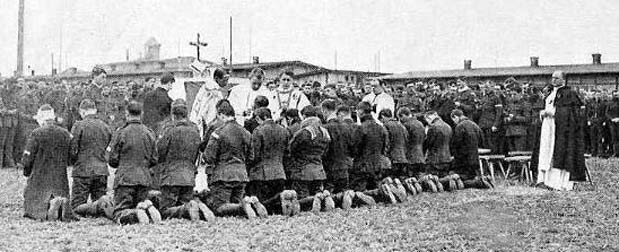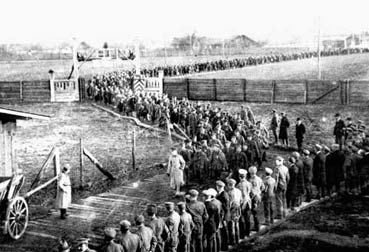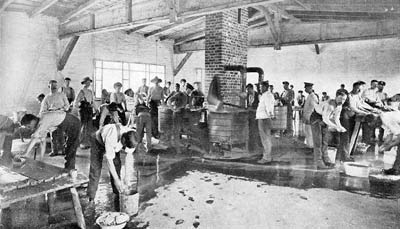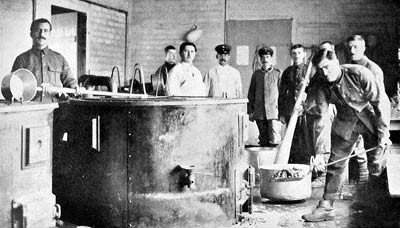

A group of British prisoners of war in Germany during WW1. Lots of regiments present including Royal Warwicks, Wiltshire, Northumberland Fusiliers, Borders etc. There is an NCO of the Royal Dublin Fusiliers who has a string of medal ribbons (sitting on chair, front row, fourth man from the right).
Those that were captured were mainly put into a prisoner of war camp at Limburg. It was the prisoner-of-war camp that Roger Casement went in to try and recruit an Irish brigade. Casement misjudged these Irishmen’s loyalty to each other. They had come through hell and were not going to betray their fellow soldiers with whom they had fought and died. Out of 2,500 Irish soldiers who were congested in Limburg, Casement managed to recruit about 56 accordinng to his letters (and this agrees more or less with British estimates) , and they were transferred to a place called Zossen bei Berlin where they trained.. 5 of them certainly were Dublin Fusiliers - 9625 Private J Mahoney, 11438 Private Henry Burke, 11374 Private John Curry, 7895 Private Joseph Stacey, 11350 Private Thomas Joseph Wilson.
A dispatch from the German War Office in March 1915 gave details of a rule for all Prisoner of War Camps. Prisoners were not allowed to write more than two letters a month, not exceeding four pages, and six pages of ordinary size in the case of officers and soldiers respectively. In addition, one postcard a week was allowed. Prisoners were also “required to impress on their families the desirability of not writing too often, of restricting the length of their letters, and of writing clearly and legibly.” (Leinster Leader, 20 March, 1915 ) Letters were censored, items such as parcels from home were often never received.
The causes of death among POWs vary from camp to camp and vary throughout the war. Flu caused quite a few deaths as did fleck or spottted typhus, especially in Wittenberg. TB became a problem at Limburg and it will have caused significant casualties though many would be after the war. In tented camps in 1914/15 there were a significant number of deaths caused by the poor conditions which were far worse than those described for Limburg. A small number died through accidents and some were shot. Many also died as a result of lack of care and medical attention. The figures for British Prisoners of War who died in POW Camps were, Officers 172 and Other Ranks 6249. A figure of 3% has been quoted for British prisoner of war who died in German hands

It proved difficult for the Germans to provide a prisoner of war with everything they neded for a reasonable existence. As the war progressed the Royal Dublin Fusiliers Prisoners of War Committee became more and more important. Limburg, in particular, housed many Co. Kildare soldiers who were the recipients, if the parcel gor through, a standard fortnightly supply of :- 1 tin of coffee and milk, 1 tin of condensed milk, 1lb of tea, 1lb of bacon and 1lb of cheese to augment their prisoners’ fare, which was understood to be very meagre. (Leinster Leader, -11 September, 1915) Cigarettes, papers and magazines were always on request from the prisoners.
The Co. Kildare Committee of the RD.F. alone, dealt with 500 prisoners of the R.D.F. in 1916 (the total number of RDF seems to have been about 600). Various fund-raising events were organised by the Committee to help the Soldiers in whatever way possible. It is difficult to get a complete list of Royal Dublin Fusilier POWS. My first efforts yielded a list of 110 names of whom 2 (possibly 3) joined Casements Irish Brigade. It also included 27 deaths in captivity.


Mrs. Loveband’s name is mentioned many times in relation to fund-raising events and committees organised for the aid of soldiers. Her own husband was killed in June 1916. Colonel Loveband died on the battlefields of Flanders as he commanded the Royal Dublin Fusiliers. He was survived by his son and wife and recommended by Sir John French, commander-in-chief of the home forces, for the distinguished conduct order.
In July 1916, the Americans reported the shooting of the second Irish POW (I cannot get details of this or any other shooting) at the propaganda prison camp at Limburg-am-Lahn in Prussia. The Germans became quite upset, and threatened to restrict American access to war prisoners by denying them private conversations. Allied protests and neutral inspections prompted the Germans to improve the sanitary conditions in POW camps radically. At Limburg-am-Lahn, an American embassy attaché reported excellent sanitary conditions in the camp. German medical authorities set up sanitary regulations for the POW system based on scientific principles. The first step was to clean the bodies and clothes of incoming POWs. Newly arrived prisoners reported first to the prison showers and delousing station. POWs surrendered all of their clothing for fumigation and hot steam treatment, passed through showers or baths, had their heads shaved to eliminate any remaining lice, and reported for an inspection by a doctor. Camp authorities set up quarantine stations near the disinfection facilities so that large numbers of POWs could be immediately separated from the main prison population if a contagious disease was detected. The hospital had a staff of five German doctors. An inspecting American attaché found few patients and his report reflected favorably on the health of the POWs. The next step was to maintain the health of the inmates. Camp officials organized a sanitary corps of POWs to maintain the hygiene and cleanliness of the camp. All prisoners were required to shower or bathe at least twice a week, and could usually bathe more often if they desired. The Germans constructed new barracks designed to improve ventilation, since sealed buildings promoted the spread of airborne diseases. Prisoners also participated in military drill, calisthenics, and gymnastic exercises under the orders of their own non-commissioned officers to keep physically fit. In addition, German doctors made rounds through the barracks every morning so prisoners could report for sick call.
 |
 |
Disinfecting arrivals at Limburg |
Laundry |
 |
 |
Showers |
Kitchen |
A Celtic Cross at Limburg is dedicated to forty five Irish soldiers who died there during world war one while they were prisoners of war in Limburg and is located in what is left of this very large prisoner of war camp.
On 21 Jan 1919 a reception was held in Dublin for 400 repatriated Dublin Fusilier prisoners. Obviosly some of the total had died and some were English who would not have returned to Ireland if they had been demobilised in England.
Prisoners of war went through hell during the war. The Earl of Mayo, a retired Lord Lieutenant and resident at Palmerstown House, Naas, reported from London hospitals which held Irish prisoners of war recently returned from Germany. The following is an extract from one of his reports:-
“I went to see Private T. Donohoe, 11282, Royal Dublin Fusiliers. I saw him at York Gallery, Brompton Hospital, Fulham road, on December 14th, 1915. He said: ‘I was taken prisoner on August 27th, 1914, and was then taken to Senelager, and there the food was very bad. All latrines were open, a very heavy fatigue duty in building huts, and the men were hammered by the Germans in charge if they shirked work. Some parcels were received in November, 1914, at Senelager.....In July, 1915, I went into hospital with lung trouble. I was badly looked after in hospital. There was only one German orderly to about 50 patients in the ward; no medicines, but, they were given morphia. Some men never woke up from this morphia treatment, and they were buried. The morphia was given out in drops by the orderly, and he was not very particular about the dose.” Kildare Observer, 1 January, 1916
Other reports about Limburg include letters from 8630 Private John Doran,2nd Battalion. Private Doran was on the special reserve after 12 years' service on the outbreak of war. Mrs. Doran asked the Kildare Chronicle a letter home received in Naas in November 1914 from a P.O.W. Camp in Germany: Later on 1 January 1916 he was reported to be at at Limburg Camp
“Dear Mother, I now take the pleasure of dropping you these few lines hoping to find you all in good health, as this leaves me at present and Paddy in the best of health. Dear mother, I was glad to get the fags and shirt, as we had a good smoke. Hope Lizzie is minding little Maggie, as my heart lies in her. Let me know in your next letter if you heard from Tom or B., as we hear they are coming out. I hope not. Tell the old fellow and Bessie and Mary that me and Paddy wish them all a happy Christmas, as we will make ours as best as we can. Hoping to hear from you soon, and thanks to Mrs. Loveband for the parcels. No more at present -from your son, J. Doran. 8630 Pte.J. Doran, English Lager Sennelager, Paderborn, Germany”
Kildare Observer of Oct 1914 reports that Private Johnny Doran, 2nd Battn. R.D.F., has written to his wife. The letter bears the date 11th September was only received by Mrs. Doran on Saturday evening last, October 24th. It reads -
"My dear wife, - I suppose you must be in a bad way since you got no letter from me, but it was not my fault. I would have written long ago, but we are only getting the privilege now. When you receive this letter I want you to send me on a box of cigarettes, as we can't get any smokes here, as we have no money. (The letter goes on to state that the parcel must be under 10lbs. weight, and contains a request that his wife would send him a home-made cake.) It continues: - "I must have some one's prayer, as so far, I am safe and well. Tell Maggie and Sonnie to pray for me until I return. Please God, it won't be too long. Tell my mother to send on Paddy (The writer's step-brother) the same as you will send me. Tell her that Paddy and I are prisoner of war together, and Paddy is all right and in good health. Let me know if you have heard anything about T. Higgins, as I did not see him since I came out. I wish to God the war was over until we get home. - Your loving husband,"John".
On a postcard received by Mrs. Doran by the same post and bearing the Seane Lager postmark, with the date October 16, 1914, Private Doran says:- "We are getting treated all right in Germany. Tell all the neighbours I was asking for them.
English Private Thomas, of the 2nd Battalion Royal Dublin Fusiliers. Kildare Observer carries on 27/3/1915 a story of his experiences as a prisoner in Germany
"Spat on and Kicked" At Cambrai station, when I was on my way to Germany, the German soldiers caught hold of me and threw me out of the cattle truck into the middle of the traffic on the station. They spat on me and kicked me everywhere." Such was the statement made to a Press representative by Private Thomas English, of the 2nd Battalion Royal Dublin Fusiliers, who had been a prisoner of war in Germany, and was one of the first batch of seriously wounded prisoners to be exchanged through the intervention of the Pope. This young Irish soldier, who is scarcely yet out of his teens, is now at home with his widowed mother in Dalkey Hill, Dalkey.
"Did you receive any better treatment from the Germans by reason of your being an Irish soldier?" he was asked. "No," he replied, "not in my experience. When bringing us as prisoners, the German put us into cattle trucks and we were travelling for three days and three nights. They brought us to Munster when we were put into a kind of circus, which had been converted into a hospital. Here we were looked after, and they gave us what we could eat and plenty of it. Having spent a fortnight there, they put us into a big camp, where there were French, Belgian, English and Russian soldiers. When we went into the camp, they treated us very badly, and especially about food. They gave us about eight ounces of bread, half a pint of coffee, and a pint and a half of soup every day." Private English added that the German soldiers, many of whom could speak English, frequently boasted to the prisoners that the German army would soon be in England. Describing how he was wounded, he said that it was at the tail end of the retreat from Mons.
....... After spending six weeks in the hospital, they were conveyed as prisoners of war to Germany. When about five months in the prison camp, the badly wounded were ordered one day to fall out, and their names were taken. He was one of the first batch to be sent home, but spent some time in Millbank Hospital before coming to Dalkey.
Copy of letter received by Kildare Observer "We have received the following letter from Private Philip Halleron (9639), 11. Bat. 6 Camp. No. 729, Limburg (lahn). Germany bearing the post mark of 26th April. Private Philip HALLERON, 2nd Battalion was reported Prisoner of War, May 15, 1915. Born Naas.
"Sir, - On behalf of a few Naas men of my regiment (the Royal Dublin Fusiliers) who are here as prisoners of war and who were readers of your paper before the war broke out, I ventured to write this card and to ask you if you could see your way to send us something now in our time of trouble. As it seems to be the custom of provincial journals to look after the prisoners of their particular town or county, I am sure you will not be far behind other papers in this matter. Should you see your way to fall in with this suggestion, the most suitable things to send are eatables, tobacco and cigarettes at present. Wishing your paper every success. The number here from Naas and district is about 10 or12 men. I remain, sir, yours sincerely Philip Halleron
Private Joe Hickey had been in Seane Lager in Oct 1914. And by 1 January 1916 was reported wounded and Prisoner of War at Limburg Camp. Born Back Lane, Naas. Private Hickey is 19 years of age and joined the Dublin Fusiliers in May, 1913. He was wounded in the Battle of Mons and has recovered from the effects. His elder brother Private Hickey, of the 1st. Battn. of the R.D.F., is at present with his Battalion in Madras, India. A letter to his mother in Oct 1914 reads
"Dear Mother, - Just a line hoping to fine you al a home in good health, as I am. I am at present along with the rest of the Battalion. We are getting no cigarettes here, so I would be very thankful if you could send me a box of "Woodbines" and some story book and a cake of bread. We are allowed to receive parcels up to the with of 10lbs, and don't put any stamps on it, as it is allowed to come free of charge. Make up the weight of the parcel or box with the story books. We get no money here, so we can't buy anything. I would like to be with you for the Christmas and I hope you enjoy it. Tell father to send me some of his books, as I can't read German and they are the only thing we can get here - Your loving son,"Joe"
Private Thomas.Higgins of the 2nd Battalion was reported back home on 1 January 1, 1916 following 16 months as Prisoner of War in Germany. Born Naas. He was wounded and captured in 1914.
Kildare Observer in Oct 1914 reported that Mrs. Higgins, Fair Green, Naas, has received the following post card from her husband Private Thomas Higgins, 2nd Battn. Royal Dublin Fusiliers, who is a prisoner of war at Gefanegnen Lager, Doeoeritz, Ubungsplatz, Germany:- "Just a few lines to let you know that I am still alive. I got wounded in the hand, but it is nearly all right again now. I was taken prisoner in France and brought here. I am quite safe here and you need not be fretting. I hope you receive the pay I left you all right. Tell little Nelson (his little daughter) not to be fretting as I will be home as soon as the war is over. Do not mention the war when writing to me, as I will not get it if you do. If you can at all send me some cigarettes". Private Higgins was wounded at the Battle of Mons, and at the time of the outbreak of hostilities had only been five months on the reserve, after his return from India.
On Christmas Eve 1915 Private Thomas Higgins, after a sojourn of 16 months as a wounded prisoner of war in Limburg, Germany, tells his story to the Kildare Observer. It included an account of Sir Roger Casements attempts to recruit Irish soldiers into a Brigade with the express purpose of fighting against the British army and alongside other Germans: -
“We began to feel that the Germans were not such bad fellows after all as out first impressions of them led us to believe. But we were soon to learn the reason of our good treatment. The Irish prisoners were kept by themselves. One day Sir Roger Casement came to us read some Irish history for us and told us about Ireland’s wrongs of the past.
“Now”, he said, “is the time to strike a blow for Ireland,” and lots of other stuff like that. We were then told that an Irish Brigade was to be formed from amongst the prisoners. We were to be given uniforms of green with shamrocks as collar badges. We were to be equipped and fitted out in every way to fight for Ireland. They took the precaution of meeting an objection that would occur to many of us even supposing we were willing to become traitors to our Empire: “If you join the Irish Brigade and the Germans win this war they will land the Irish Brigade in Ireland to free Ireland, and send some German troops to reinforce you. If the Germans do not win the war We will give you £20 each, send you to America, and guarantee you employment there with German firms.” We booed Sir Roger Casement out of the camp, and he only came once again after that To distribute books about the history and wrongs of Ireland – Things that happened years ago. “Some of our fellows were foolish enough to take the bait. In a sense they could hardly be blamed for it. Any man who joined the Irish Brigade was starved into it. Very few, however, went… After that we were again treated like dogs.” Kildare Observer- 1 January, 1916
An interview with a POW who was In Limburg 9/12/1914 to 1/12/1915
In November 2007 the German town of Dietkirchen restored and rededicated a Celtic cross erected in May 1917 to the memory of 45 World War 1 Irish soldiers who died in a prisoner of war camp which lay between this town and Limburg in western Germany. No trace remains today of the 24 hectare camp which held up to 12,000 prisoners of war. It’s believed that the soldiers died from a combination of battle injuries and disease in the camp with most of the remains being removed and interred in other military cemeteries. The 3m high Celtic sandstone cross, one of the few of its kind in mainland Europe, had deteriorated significantly due to 90 years of weather exposure and was in a very fragile condition before the decision to restore it was taken. The local community held Irish folk festivals and concerts to raise the funds while donations were received from the Royal Munster Fusiliers’ Association, other military associations and the Irish Government. During the summer the cross was restored in situ.“When I was at Cassel Camp the Irish RC’s were told to give in their names and, if they did so they would be removed to another camp where the treatment would be better. I gave in my name and was shortly afterwards transferred to Limburg. This was in December 1914. In February 1915 Sir Roger Casement made us a speech asking us to join an Irish Brigade, that this was “our chance to strike a blow for our own country”. He was booed out of the camp and later he returned but did not speak to us again. We were then marched up to the Russian Lines (by which he means the Russian compound at Limburg Camp) where our names and regiments were written down and we were asked again to join. Out of about 800-900, 47 joined and were taken away. After that further efforts were made to induce us to join by cutting off our rations, the bread ration was cut in half for about 2 months. No others joined beyond the 47. One of the men, Greer, who joined is now drawing allowance for his sister from the Government, so I am told.”
The names of the 45 soldiers engraved at the base of the cross had become totally illegible and have now been re-entered on a new bronze plaque. The first name on the plaque is 40 year old Frederick Kelly, the first man to die in the camp on 20 December 1914 and recently the Dietkirchen authorities have named a new street overlooking the graveyard in his honour. At the rededication ceremony a local priest blessed the cross to the melody of the Der Gute Kamerad (The Good Comrade) in the presence of townspeople and visitors from Britain and Ireland. The cross was erected on 25 May 1917 at the initiation of Rev. J. T. Crotty, a Dominican priest from Kilkenny who was sent by the Vatican to administer to the spiritual needs of the Irish prisoners. Speaking after the rededication ceremony, Mr. Bernhard Eufinger, leading official (Ortsvorsteher) in the town of Dietkirchen said that the cross, standing on that spot for 90 years should serve as a symbol of reconciliation but also stand as a reminder of the immeasurable suffering of the two World Wars in the 20th century.
www.limburg-dietkirchen.de is a website which contains pictures and a story of the Dietkirchen (Limburg) POW as well as it's history. Dietkirchen is the place where the camp itself was located. Dietkirchen is a small village very close to Limburg and today an official part of the city of Limburg while it had it's own local goverment in the time of the Great war.